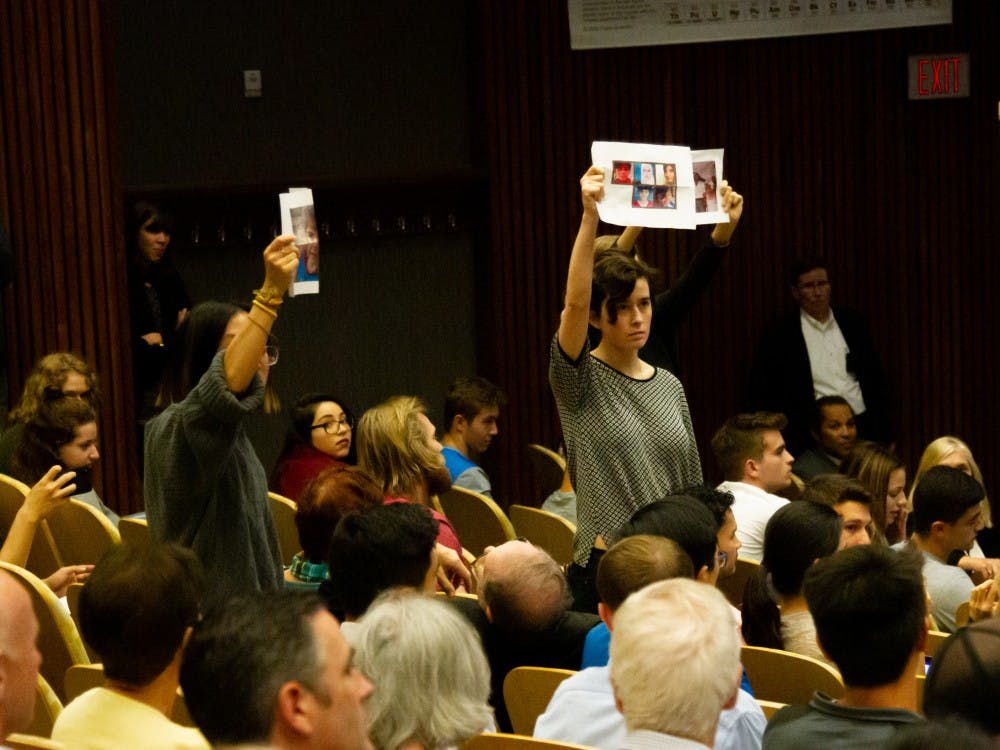An event featuring former Israeli Foreign Minister Tzipi Livni was interrupted by around two dozen protesters Wednesday evening.
As soon as moderator Bruce Jentleson posed his first question to Livni about the 2008 and 2009 Gaza War, one student stood up and began to speak loudly.
“I’m sorry, but the 2008 Israel-Palestine War? That was a massacre,” the student began, before being drowned out by conflicting shouts of support and opposition, as some yelled for the protester to “sit down” while others demanded that the audience “let her speak.”
A security guard approached her shortly after she began yelling and handed her a small card, which she accepted, but the guard did not escort her out immediately.
As soon as the first protester paused, more students began to stand up to voice their opinions over the next several minutes. Many protesters read the names of people who had been killed by Israeli forces, holding up pieces of paper with pictures of those who had died. They then began to chant about Livni.
“We will have a civil discourse for all of these issues that people care about,” said Jentleson, William Preston Few professor of public policy, after the first protester spoke. “You’ve had your say—there are other people here who want to participate.”
Around 2 ½ minutes after the protest began, the students began to file out of the auditorium while shouting “shame” and “you don’t belong here” toward Livni.
“Just because they’re Palestinians doesn’t mean their lives don’t matter,” one student shouted as she left the room.
Some of Livni’s critics point to her involvement in a three-week bombardment and blockade of the Gaza Strip, while her defenders hail her as a leader of the Israeli peace movement and push for a two-state solution. A petition calling on Duke to cancel the talk had received more than 500 votes as of Wednesday evening.
Once the protesters left the room, Livni briefly addressed their chants.
“You know what’s a shame? It’s a shame that we cannot have this discussion,” she said.
Later in the talk, Livni added that her goal is to give people tools and answers—not just her ideological views—about the situation, which she said that the protesters missed “because they’re not willing to listen to the truth.”
The event was sponsored in part by the American Grand Strategy Program, whose director is Peter Feaver, professor of political science and public policy. Feaver attended the event and told The Chronicle afterward that he was disappointed by the protesters’ tactics.
“I understand their passion, but I was disappointed in the approach they took, which had the effect of closing off discussion rather than promoting it,” Feaver said.
Mary Pat McMahon, vice president/vice provost for student affairs, also attended the event and was present when the protest took place.
“The students who attempted to disrupt the event this evening clearly had impassioned views,” she wrote in an email to The Chronicle after the event. “From my perspective, Minister Livni seemed genuinely interested in having a discourse with them as part of the program. I’m interested in working with student groups and faculty in the future to determine if we can find avenues to foster constructive engagement with speakers.”
Feaver mentioned he had contacted one of the protesters he knew before the event and provided them with the option “to formulate a tough question” for Livni to address. However, they chose not to accept that choice.
“I think that would have been a much more effective way of critically engaging [Livni], putting her to the test and asking her to answer different questions,” he said. “I gave them that option, and they rejected it.”
Sophomore James Mbuthia, one of the protesters, explained that when Feaver found out that the group was organizing a protest, he wrote an email encouraging them to “explore whether there are not more constructive ways” of organizing.
Mbuthia argued that Duke inviting Livni with the assumption that everyone would benefit from the conversation was based on “white privilege” and was an “act of violence.” He said that this act of violence needed to be countered by a protest.
Get The Chronicle straight to your inbox
Sign up for our weekly newsletter. Cancel at any time.
Sophomore Olivia Levine, a member of the audience not involved in the protest, said that she thought Livni gave an effective response as to why there needs to be dialogue on both sides of the debate.
“What I did not appreciate about the protest is that people came in and they stormed out without even letting [Livni] respond when the whole point is that you should have a dialogue, talk to someone and ask questions so you can actually understand where the decision came from and how the events played out from her perspective,” she said.
When asked whether the possibility of a protest affected AGS’ choice to bring Livni to campus, Feaver answered by addressing the group’s mission.
“Our mission is to bring a diverse array of speakers to engage the students, especially the voices that really matter for big policy issues in international relations,” he said. “We are looking for speakers who are serious, who are not themselves provocateurs, just going on campus to stir things up. Obviously, Minister Livni is a very serious world leader.”
Despite the protest, Feaver called the event “very successful” and mentioned that he was proud of the AGS and Duke team for putting the talk together.
Mona Tong contributed reporting.

